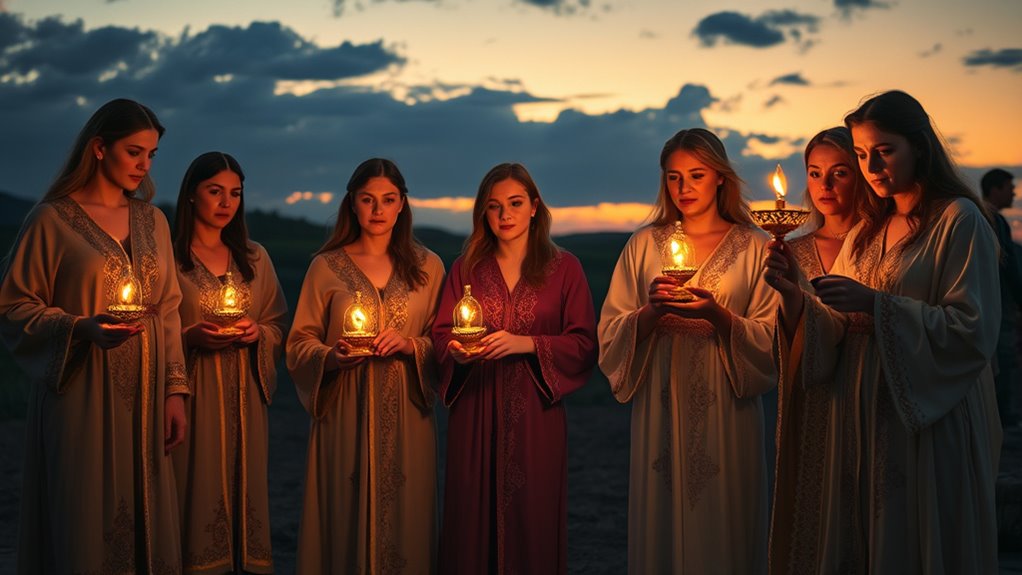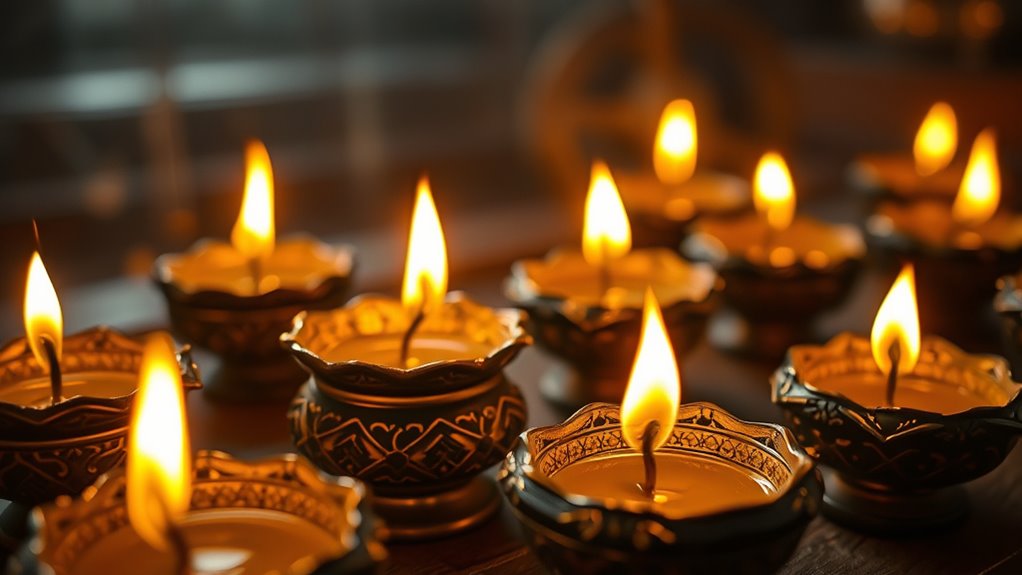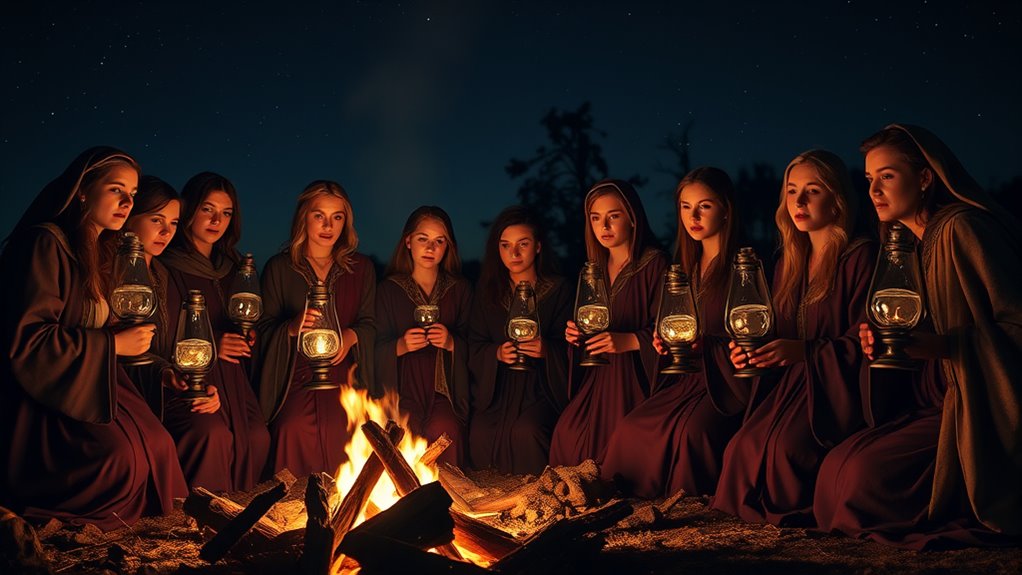The Parable of the Ten Virgins teaches you to stay vigilant and prepared for life’s unexpected moments. As the bridesmaids wait for the bridegroom, you’ll see the importance of being ready at all times—keeping your spiritual lamps filled and avoiding complacency. Those who are unprepared miss out on the celebration, reminding you to focus on constant readiness and responsibility. To understand the full lessons and how they apply today, explore the key insights further.
Key Takeaways
- The parable illustrates the importance of spiritual preparedness and vigilance for Christ’s return.
- Wise virgins have extra oil, symbolizing foresight and readiness; foolish virgins lack preparation.
- Lamps and oil represent ongoing spiritual devotion and maintaining faithfulness at all times.
- Delays and nighttime waiting emphasize the need for constant alertness in life and faith.
- The parable warns of missing divine opportunity due to neglecting personal responsibility and spiritual readiness.
The Setting of the Parable

The setting of the Parable of the Ten Virgins takes place in a rural village where ten bridesmaids, or virgins, wait for the bridegroom to arrive. To understand this scene, consider the cultural context of ancient Middle Eastern wedding customs, where weddings were significant communal events. Historically, the bridegroom’s arrival was often unpredictable, so bridesmaids needed to be prepared, sometimes waiting overnight. During this period, oil lamps were essential for visibility and safety, symbolizing readiness. The story reflects a time when social obligations and hospitality played crucial roles in daily life. Recognizing these customs helps you grasp why the virgins’ preparedness or lack thereof had such consequences, emphasizing the importance of vigilance and cultural norms in that historical setting.
The Characters Involved

You’ll want to understand who the wise and foolish virgins are and what they represent. The wise virgins prepare ahead, while the foolish ones neglect to do so. The bridegroom’s role also highlights important lessons about readiness and anticipation.
The Wise Virgins
In the parable, the wise virgins are the characters who prepare themselves wisely for the bridegroom’s arrival by bringing extra oil for their lamps. They understand the importance of being ready, especially during wedding preparations, which often involve long waiting periods. Their foresight reflects cultural traditions where planning and patience are valued. These virgins stay alert and responsible, knowing that the bridegroom could arrive at any moment. By bringing extra oil, they ensure their lamps stay lit, symbolizing spiritual preparedness. Their actions contrast with others who are unprepared. The wise virgins show diligence and prudence, embodying the qualities needed to fulfill their roles in the wedding celebration. Their readiness highlights the significance of foresight and cultural understanding in these traditions.
The Foolish Virgins
Although they are part of the wedding procession, the foolish virgins fail to prepare adequately for the bridegroom’s arrival. They lack faithfulness in their readiness, showing a disregard for the importance of preparedness. Instead of bringing extra oil, they rely on others’ supplies or hope for the best, which reveals their careless attitude. Their lack of foresight demonstrates a weak commitment to being ready at all times. As a result, when the bridegroom arrives unexpectedly, they are caught unprepared, unable to join the celebration. Their failure highlights the importance of constant vigilance and faithfulness in spiritual readiness. The foolish virgins serve as a caution: neglecting preparedness can lead to missing out on the blessings when the time comes.
The Bridegroom’s Role
The bridegroom plays the central role in the parable, representing Christ as the one arriving to gather His bride, the Church. In wedding traditions, the bridegroom’s arrival often signifies a moment of joy and anticipation, mirroring divine cultural symbolism of Christ’s return. His delay emphasizes the need for vigilance, urging believers to stay prepared. The bridegroom’s arrival is unexpected, highlighting the importance of readiness in spiritual life. Just as cultural customs mark the wedding day as a significant event, the bridegroom’s role underscores the significance of Christ’s return in biblical teaching. His presence signifies fulfillment and divine promise, reminding us that the timing of His coming is unknown but certain, urging us to stay alert and faithful.
The Significance of the Lamps and Oil

The lamps and oil in the parable symbolize readiness and spiritual preparedness. Their symbolic meaning goes beyond physical objects, reflecting your internal state and vigilance. In the cultural context of biblical times, oil represented sustenance, wisdom, and divine favor. When you keep your lamp filled with oil, you’re actively maintaining your spiritual life, staying alert for the Lord’s return.
Consider these emotional truths:
- You can’t borrow faith or preparedness at the last minute.
- Your spiritual readiness is a personal responsibility.
- Falling asleep symbolizes neglecting your spiritual duties.
- The oil signifies ongoing commitment and devotion.
- Being prepared ensures you won’t face disappointment or regret.
This parable reminds you to stay vigilant, understanding the deeper cultural and symbolic meaning behind these elements.
The Bridesmaids’ Different Choices

The bridesmaids in the parable make different choices based on their level of readiness, highlighting the importance of personal responsibility in spiritual preparedness. Cultural differences and the historical context of wedding customs influence their decisions. In some cultures, bridesmaids prepared extensively, carrying extra oil and supplies, reflecting a sense of duty and foresight. Others, perhaps influenced by societal expectations or complacency, chose to be less prepared, risking their ability to participate fully. These choices mirror how personal commitment and awareness shape spiritual readiness today. The parable encourages you to contemplate how your own choices—whether to stay vigilant or be complacent—affect your preparedness. Recognizing these cultural and historical nuances helps you understand the significance of personal responsibility in maintaining spiritual alertness.
The Arrival of the Bridegroom

As the bridegroom approaches, you’ll need to stay alert and attentive, knowing the moment could come at any time. Midnight vigilance is vital because delays can catch you unprepared. Being ready guarantees you won’t miss the celebration, no matter how long you wait.
The Bridegroom’s Approach
Just when everyone was settled and prepared, the bridegroom suddenly arrives, catching the virgins off guard. The air shifts from anticipation to urgency as the moment unfolds unexpectedly. You realize that despite all your wedding preparations and cultural traditions, preparedness is essential. The sound of the bridegroom’s approach stirs emotions—hope, excitement, and anxiety. Suddenly, the following feelings grip you:
- Heart pounding with anticipation
- Anxiety over missed oil or readiness
- Joy at the approaching celebration
- Fear of being unprepared
- Urgency to be ready at all times
This unexpected arrival reminds you that, no matter how well you prepare, staying vigilant is vital. The bridegroom’s approach emphasizes the importance of constant readiness, not just in wedding traditions but in life’s spiritual journey.
Midnight Vigilance Needed
Because the bridegroom arrives unexpectedly in the dead of night, staying vigilant becomes essential. You must remain alert, knowing that the moment of arrival can come at any time, just as the parable teaches. This vigilance aligns with celebration etiquette—being prepared and attentive to the symbolism behind the event. The cultural symbolism of waiting patiently and maintaining readiness highlights the importance of spiritual watchfulness. It’s not just about physical alertness but also about keeping your heart and mind prepared for the significance of this divine moment. As the night deepens, your focus should be on maintaining readiness and avoiding complacency. This attitude reflects respect for the tradition and the deeper meaning behind the arrival of the bridegroom.
Readiness and Delay
The arrival of the bridegroom can be delayed, testing your patience and preparedness. Historically, this delay reflects the unpredictable timing in cultural interpretations of weddings, emphasizing vigilance. During this waiting period, you might feel:
- Anxiety growing as time stretches on
- Doubt creeping into your mind
- Frustration at the unexpected wait
- Urgency to stay alert and prepared
- Fear of missing the moment entirely
In the biblical context, delays symbolize life’s uncertainties, urging you to remain ready at all times. The cultural interpretations highlight that the bridegroom’s arrival isn’t always predictable, reminding you that spiritual preparedness requires constant vigilance. The historical background reinforces the importance of staying alert, regardless of how long the wait may seem.
The Consequences of Being Unprepared

Failing to prepare can leave you stranded when opportunity or crisis arrives unexpectedly. Without faith and preparedness, you risk being unready for divine judgment, which requires vigilance and foresight. The parable warns that those who neglect to keep their lamps full may find themselves shut out when the bridegroom arrives. When you’re unprepared, you miss the chance to enter the celebration, emphasizing the importance of constant readiness. This neglect can lead to regret and separation from divine blessings. The consequences are severe—you may face disappointment and exclusion because you didn’t prioritize spiritual vigilance. Your lack of preparation shows a disregard for divine timing and judgment, highlighting that spiritual readiness isn’t optional but essential for avoiding the painful consequences of being unprepared when it truly matters.
Spiritual Lessons From the Parable

This parable teaches us that spiritual preparedness is essential for being ready when divine opportunities or judgments arrive. Your faith preparedness and spiritual awareness determine if you’ll be ready when the moment comes. It reminds you to stay vigilant and nurture your relationship with God daily.
Consider these lessons:
- Never assume you’ll have more time to prepare.
- Cultivate consistent prayer and study to strengthen your faith.
- Recognize the importance of being spiritually alert.
- Avoid complacency; stay vigilant in your walk with God.
- Be intentional about maintaining your spiritual lamp, so your light shines brightly when needed.
Modern Applications of the Story

In today’s fast-paced world, the parable of the ten virgins serves as a powerful reminder to stay spiritually vigilant amid constant distractions. This story highlights the importance of preparedness, which applies to all areas of life, including faithfulness in relationships. Just as the wise virgins brought extra oil, you need to nurture your spiritual and emotional reserves to remain steadfast and committed. Being prepared means actively maintaining trust and integrity, especially when challenges arise or temptations test your dedication. The parable encourages you to prioritize readiness over complacency, ensuring you’re always ready for life’s uncertainties. By practicing faithfulness and staying prepared, you build stronger relationships and a resilient spiritual life, embodying the timeless lessons embedded in this story.
Reflecting on Vigilance and Readiness

Vigilance and readiness are essential qualities that enable you to respond effectively to life’s unexpected events. When you stay alert and maintain faithfulness in your preparedness, you build resilience for the unforeseen. Reflecting on this, consider how your daily actions demonstrate your commitment to being ready.
- Feel the weight of missed opportunities due to neglecting faithfulness
- Recognize the peace that comes with consistent preparedness
- Understand how complacency can leave you unprepared in critical moments
- Embrace the discipline needed to stay vigilant amidst distractions
- Cultivate a mindset that values readiness over complacency
Frequently Asked Questions
What Cultural Context Influenced This Parable’S Message?
You see, cultural context shapes the message here. Jewish customs and wedding traditions influenced this parable’s meaning, emphasizing the importance of preparedness. During Jewish weddings, brides and virgins waited for the bridegroom, often late, requiring alertness and readiness. So, you learn that being spiritually prepared is crucial, just like the virgins needed oil for their lamps, highlighting the need for vigilance and faithfulness in your life and spiritual journey.
How Does This Parable Compare to Other Biblical Stories About Preparedness?
You see, stories about preparedness often highlight eschatological themes and moral lessons, emphasizing the importance of being ready for the future. Compared to other biblical stories, this one underscores the urgency of spiritual vigilance and the consequences of complacency. Like many tales, it teaches that staying prepared aligns with divine expectations, encouraging you to live responsibly and watchfully, ensuring you’re always ready for what’s to come.
What Are Common Misconceptions About the Virgins’ Actions?
Many people have misconceptions about the preparations in this story, often thinking the virgins’ delay was purely about laziness. In reality, their actions symbolize spiritual readiness, with virginity representing purity and vigilance. You might assume their actions show foolishness, but it highlights how neglecting spiritual preparedness can lead to missed opportunities. These misconceptions overlook the deeper symbolism of the story, emphasizing the importance of constant spiritual alertness and readiness.
How Can This Story Be Applied in Non-Religious Contexts?
Imagine standing at a crossroads, knowing that careful planning shapes your journey. In non-religious contexts, you can see this as a lesson in risk management and time management. Just like preparing for an uncertain night, you prioritize tasks, save resources, and stay alert for opportunities. This story reminds you to be proactive, ensuring you’re ready for unexpected challenges, making your goals more achievable and your path smoother.
Are There Historical Examples Illustrating the Parable’S Themes?
You might wonder if historical parallels exist for themes like preparedness and vigilance. Throughout history, many examples illustrate these ideas, such as wartime strategies emphasizing readiness or financial crises highlighting the importance of saving. Cultural influences shape how societies interpret these themes, emphasizing the value of foresight and caution. Recognizing these parallels helps you see how universal these lessons are, transcending specific contexts and resonating across different cultures and eras.
Conclusion
Remember, staying prepared can make all the difference—just like the ten virgins. Did you know that 60% of people admit to feeling unprepared for life’s unexpected events? This highlights the importance of vigilance and readiness in your own journey. By keeping your “lamps” filled with oil, you guarantee you’re always ready for opportunities or challenges ahead. Stay alert, stay prepared, and live with intention—because preparedness isn’t just a choice, it’s a necessity.










